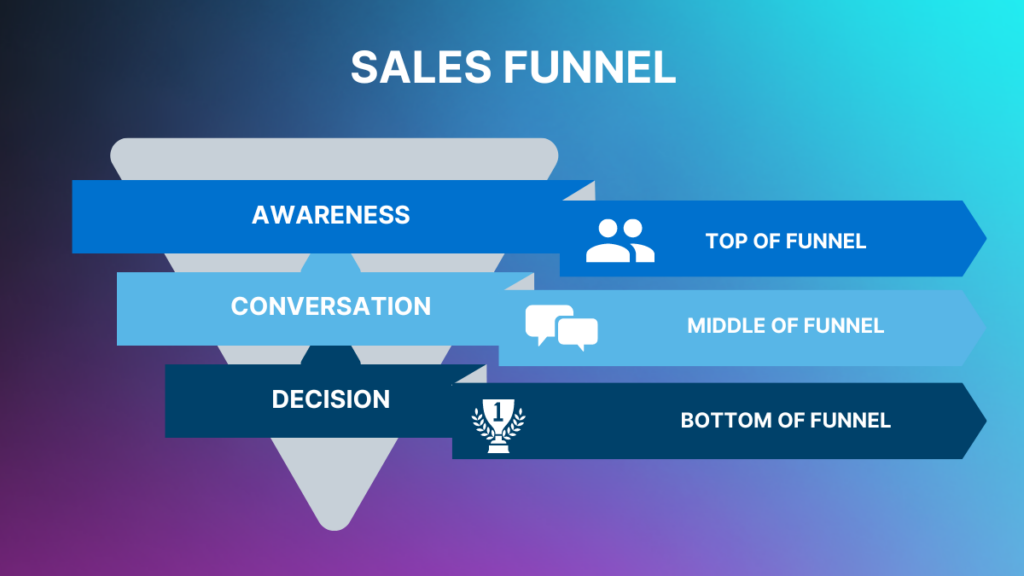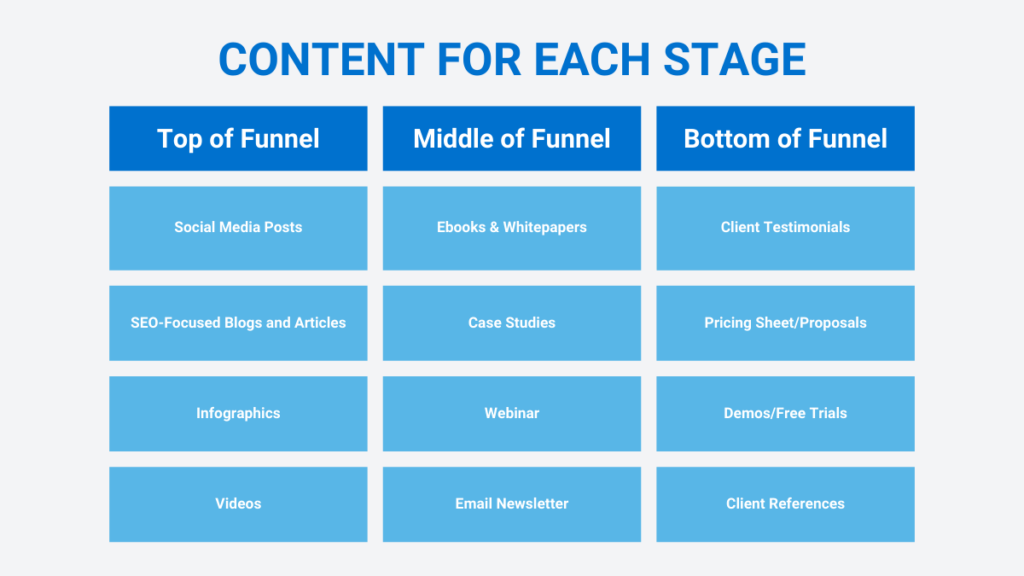Manufacturers build. But before they break ground, they have to sell. With complex, multi-layered projects and contracts that exceed six figures, long sales cycles are the norm. That means lead tracking is crucial. Your sales pipeline won’t have the volume of a D2C product, which gives you the luxury–and the challenge–of creating a meticulous sales funnel.
Whether you use a customer resource management system (CRM) or a spreadsheet to keep track of potential leads, tech isn’t going to be the only solution. To really take care of your leads, you need to know where they are in the process of deciding to buy. A company ready to sign needs different messaging than one that just arrived on your website. But both kinds of leads are important. Figuring out where they are in their journey helps you guide the conversation and will help you close more deals and be more efficient with your time.
That’s where the sales funnel comes in handy. It functions as a map that shows how leads move through the sales process.
Here’s why the sales funnel is crucial for any B2B manufacturing team–and practical ways to implement one in your organization.

Why (and How) to Build a Sales Funnel
Understanding the Sales Funnel

A sales funnel represents the customer’s journey. It starts with the customer becoming aware of a need or problem and ends with their purchase decision. The sales funnel includes three stages:
- Top of the Funnel (ToFu): This stage is about creating awareness and generating leads. Various strategies can be used to increase brand visibility. These include content marketing, social media engagement and advertising. The emphasis is on casting a wide net to attract your audience.
- Middle of the Funnel (MoFu): At this point, prospects have shown interest in your product or service and are evaluating your offer. Your action should be to provide detailed information, address potential concerns, and highlight your unique value proposition. What makes your product or service better than someone else’s? This stage also involves engaging with leads through email, phone calls and targeted content to guide them in their process. The goal is to build trust, address lingering doubts, and position your brand as the preferred solution.
- Bottom of the Funnel (BoFu): This is the critical stage in the sales and marketing process. Prospects are now ready to make a decision. The goal of the BoFu is to remove remaining barriers or hesitations that prospects may have. Sales teams play a central role during this stage. They answer questions, address concerns and provide the necessary support for the final decision. Then, a prospect becomes a customer. This action might involve a purchase or signing a contract. Post-purchase efforts continue to ensure satisfaction, encourage repeat business and foster brand loyalty.
Understanding what stage prospects are at will allow you to make informed decisions. It also helps you get specific with whom you are marketing to.
4 Benefits of a Sales Funnel in Manufacturing
The manufacturing sales process is more complex than almost any industry. You’re probably not selling a single product–you’re selling a process. Building a sales funnel allows you to meet your clients where they are in their sales journey. Having this information comes with some benefits. By leveraging a detailed sales funnel, manufacturers can enjoy:
- Improved Lead Generation: Take the information about your prospects and create content for them. This may look like targeted ads, a workbook, or even a personalized email. This helps attract prospects and may lead to a closed sale.
- Greater Customer Retention: The more you know about your prospects, the more you can build on the relationship. This also creates good ground for your post-sale relationship. If you continue to provide value to your customers, they are more likely to stick around.
- Streamlined Sales Process: Having a sales funnel makes it easy for your sales team. It gives them insight into where the relationship with the prospects is heading. This allows sales teams to make smarter decisions about conversations they need to have.
- Data-Driven Growth: Tracking funnel metrics and analyzing your prospects can help sharpen strategy and inform business development.
Marketing Components of a Manufacturing Sales Funnel

Top of the Funnel: The goal is to make more people aware of the brand and connect with the right audience. Content such as social media posts, SEO-focused articles, and webinars can attract prospects.
Middle of the Funnel: Communication is key. Personalized email campaigns, targeted case studies, and white papers can deepen the relationship.
Bottom of the Funnel: This stage is about convincing the lead that your product or service is the best choice. Tailored demonstrations, detailed proposals and a strong sales team are your best assets for closing the deal.
Strategies for Effective Sales Funnel Construction
To create a robust sales funnel, manufacturers or sales teams must:
- Define the Target Audience: Who are they? Identify the customer’s needs, challenges, and behavior.
- Develop Engaging Content: Create content that addresses each stage of the buyer’s journey. This could include videos, guides, sales sheets, and case studies.
- Implement Automation: Email automation and CRM tools can help engage your leads. This also frees up time for your team. Platforms like ActiveCampaign keep all your contacts in one location. It allows you to see email exchanges and organize your prospects in a pipeline. This helps track and nurture your prospects.
- Use Analytics: Measure the effectiveness of each stage of your funnel and optimize based on the insights. Pay attention to leads, traffic, conversion rate, click-through rate, return on investment, and more. These analytics provide great insight into the effectiveness of your sales and marketing activities.
How We Build Sales Funnels
To illustrate the power of an effective sales funnel, consider how Altitude helped ZefSci increase it’s qualified leads by 156% through an integrated marketing approach.
Conclusion
Establishing a clear sales funnel is essential for your manufacturing business. It provides a systematic way to understand your customer’s needs and improve your sales strategies.
Ready to enhance your manufacturing process with an effective sales funnel? Adopt these strategies and watch more of your prospects transition to loyal customers.
Ready to elevate your B2B marketing?
We help leading business-to-business brands hit their marketing goals. Get in touch to learn how Altitude Marketing can help you reach your peak performance.



